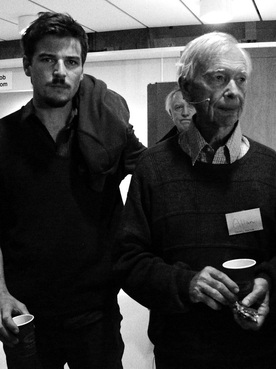 Meeting with Allan Savory in Sweden Meeting with Allan Savory in Sweden Allan Savory's work observing & managing game reserves, ranches & national parks as a biologist is only part of what he describes led him to his breakthroughs fighting desertification (and the subsequent social & economic breakdown in some of the world's most hostile environments) through holistically planned grazing. His role as President of the opposition party against a racist government in Rhodesia (now Zimbabwe) eventually forced him to seek exile in the US where he observed desertification in National Parklands as bad as anything in Africa, yet with large herbivores having been absent for decades. As late as 1969 he was advocating culling large populations of wild animals such as elephants and hippos, when they were appearing to be destroying their habitat. He had participated in the culling of 40,000 elephants in the 1950s but he later concluded the culling did not reverse the degradation of the land, calling that project "the saddest and greatest blunder of my life" in his recent TED talk. Savory was inspired by earlier work of French agronomist André Voisin (some works available freely at the awesome resource http://www.soilandhealth.org/) who observed that cattle tended to return to the same patch of grass after about three days. Savory saw this as a solution of the riddle of time and that it was the length of time cattle were left in the same area and not just simple overgrazing which led to problems. Holistic planned grazing is now happening on every continent on over 15M Ha. The interview above presents a very useful & clarifying insight into Savory's approach and work. Due to the fact that the original books were put out under "Holistic Management" has led to similar problems faced by "Permaculture" and other movements where humans, who tend to think in words, assume this is simply another strategy. Permaculture is a holistic design science, which is sadly often diluted into specific strategies or promoted from a reduced aspect for various reasons. Allan observed the same with "HM," with people seeing it as another management framework, rather than using the approach of managing holistically (to deal with eco- Social- Economic complexity) in whatever they are doing. He explains how his ideas were somewhat shunned by Bill Mollison in the early years, viewed as possible competition perhaps. Having observed how so many people miss the main point in this regard, Allan is consistently referring now to "managing holistically" to point out that this can be universally applied. We use this approach in our own farm planning and design work, as Permaculture has always lacked clear and effective decision making & economic planning tools.
Interestingly in the interview Allan shares his views regarding some Permaculture approaches, such as water harvesting, pointing out that in his mind these are symptomatic reliefs, not addressing core problems. I'm generally inclined to agree, as well as trust his experience, especially as so much of his work is focused on harsh seasonal rainfall environments where restoring water & nutrient cycles is naturally at the heart of the holistic context. I do see that on smaller scales and in various contexts where animal grazing may not be appropriate that various levels of technological disturbances are useful. Here the Keyline Scale of Permanence has been instrumental in my own design approach; for example the Permaculture idea of swales is a popular one- working at the "Landform" level of the SoP. I tend towards Keyline soil management & subsoil strategies, dealing with the "Soil" level of the SoP; looking for the same end result but dealing with a very different level of cost, risk and disturbance. Optimally, I would also see this strategy combined with holistically planned grazing, with mechanical soil remediation being a short-term reparative work to kick start the system. I do appreciate what Allan observes about how even well intentioned Permaculture design, without long term holistic planning, can at best sometimes only achieve realisation of short term goals. It's a great point when you reflect on how patterned we are into thinking in words; the idea of a "goal" in a design sense comes with some notion of a static end or climax point, rather than what Savory refer's to as "holistic context" for decision making that feels aligned with "regeneration" not "sustainability". It's certainly shaping my own education work regarding how I lead others to define holistic contexts for their own projects and lives in our trainings. Well worth a watch and some careful consideration. Personally, from my own experience, I have benefitted hugely from integrating the Keyline design approach and format as a way to organise my Permaculture design work, and managing holistically is proving an effective tool for decision making for my own enterprise as well as planning grazing and finances. We aim to open our books in the future as part of the edu media we put out from Ridgedale in our effort to support more young farmers and designers working out in the field with effective tools that can deal with the complexities we inevitably work with in agriculture. Let us know what you think below, we're always happy to hear of others broadening their design approach and integrating effective solutions for the benefit of all...
1 Comment
Christer
2/3/2014 12:51:38 am
Working my way slowly through the interview, it broadens my view ön many things.
Reply
Leave a Reply. |
Details
Like us on FB Below for regular updatesStay up to date with customized updates you want to receive
Upcoming coursesArchives
December 2016
Categories
All
|

 RSS Feed
RSS Feed